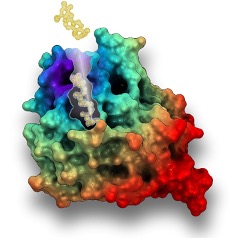Structural Biology

Structural Biology provides mechanistic details of biomolecular functionality at atomic resolution. High-resolution information about structure and conformational dynamics can be obtained by combining X-ray crystallography, cryo-electron microscopy (EM) and nuclear magnetic resonance (NMR) spectroscopy. Moreover, experimentally determined structures serve as a starting point for sophisticated molecular dynamics (MD) simulations to obtain further functional insights.
Structural biology labs at the Department of Bioscience are interested in the molecular mechanism of gene regulation and splicing, the structural basis of amyloid fiber formation and innate immunity, exploring mechanistic details of enzyme function, and high-resolution structural and functional insights into membrane proteins.
Structural biology results are essential to design tailored small molecules to target disease-linked proteins and nucleic acids in a structure-guided and rational manner.
This cutting-edge research portfolio is enabled by high-end infrastructure at the Bavarian NMR center (jointly supported by TUM and Helmholtz Munich), the protein crystallography and the TUM EM facility, in cooperation with the Helmholtz Munich cryo-EM platform. This toolset is complemented by a large set of biophysical and analytical methods and high performance computing facilities that are available in the Department of Bioscience.
Research groups involved: de Oliveira Mann, Groll, Hagn, Reif, Sattler, Zacharias